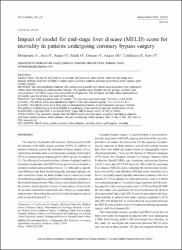Impact of model for end-stage liver disease (MELD) score for mortality in patients undergoing coronary bypass surgery

Göster/
Erişim
info:eu-repo/semantics/openAccessTarih
2021Yazar
Dolapoğlu, AhmetAvcı, Eyüp
Argan, Onur
Şafak, Özgen
Gorcan, A.
Akgün, D. E.
Çatalkaya, S.
Kiris, R
Üst veri
Tüm öğe kaydını gösterÖzet
OBJECTIVES: The aim of the study is to evaluate the predictive value of the model for end-stage liver disease (MELD) score for mortality in stable angina pectoris patients undergoing coronary artery bypass graft (CABG) surgery. METHODS: We retrospectively analyzed 261 consecutive patients with stable angina pectoris who underwent CABG while not being on anticoagulant therapy. The patients were divided into two groups: survivors and non-survivors. The MELD score was calculated for all patients. The all-cause mortality within postoperative 12 months was the primary end point of the study. RESULTS: The follow-up period was 12 months. The non-survivors were older (72.0?6.1 vs 62.4?8.4 p<0.001). The MELD score was signifi cantly higher in the non-survivors group (7.5?1.2 vs 6.7?0.7, p<0.001). The MELD score (p=0.001) was an independent predictor of postoperative one-year mortality. The addition of MELD score to EuroSCORE II signifi cantly improved the prognostic performance of the EuroSCORE II (EuroSCORE II vs EuroSCORE II plus MELD score: AUCs: 0.792 vs 0.842). CONCLUSION: Our research showed that the MELD score could be useful to predict mortality in patients who have stable coronary artery disease, and are undergoing CABG surgery (Tab. 3, Fig. 2, Ref. 25). Text in PDF www.elis.sk

















